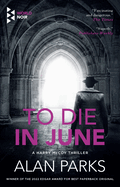
Alan Parks has put Glasgow's Detective Inspector Harry McCoy in loads of bad spots. But To Die in June--the shatteringly good sixth title in a series (Bloody January; May God Forgive) that offers its own spin on the phrase "book of the month"--finds McCoy, a hard-drinking atheist who leans on a gangster for professional help, in perhaps his most uneasy circumstances yet: attending church services.
To Die in June has McCoy continuing his gradual, somewhat grudging march through the rapidly changing 1970s. The novel begins in May 1975 with the discovery of the body of a street-dwelling, 50-something man. The medical examiner thinks the man's outsize alcohol consumption did him in. But when additional boozy middle-aged men are found dead, McCoy has to consider that their hooch is being poisoned. His perplexity as to why these "down-and-outs," as he calls them, are being targeted comes with a side of worry: the victim profile fits his father, whom McCoy would warn, if only he could find him.
That's just one of several matters that McCoy is taxed with sorting out this time around. Set against a thumping classic rock soundtrack amplifying the grit of 1970s Glasgow, To Die in June has the clipped sentences, short chapters, and economical storytelling that define Parks's series, as does McCoy's raw emotional life. His sensitivity lies in diametric opposition to the pitiless city in which McCoy often unconstructively nurses his childhood wounds, his search for criminals no more consuming than his search for inner peace. --Nell Beram, author and freelance writer

